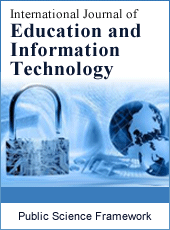International Journal of Education and Information Technology
Articles Information
International Journal of Education and Information Technology, Vol.1, No.2, Jun. 2015, Pub. Date: Jun. 2, 2015
Adopting an Incentive-Based Problem Solving Strategy in Computer Science
Pages: 55-60 Views: 5249 Downloads: 1212
[01]
Ugochukwu Onwudebelu, Department of Computer Science, Federal University of Ndufu-Alike Ikwo (FUNAI), Abakaliki Ebonyi State, Nigeria.
[02]
Chukwuka Iwundu, Department of Computer Science, Federal University of Ndufu-Alike Ikwo (FUNAI), Abakaliki Ebonyi State, Nigeria.
It is a known fact that as long as there is life, there will always be problems that demand solutions. In other words, problems are part of human experiences. The investigation of the impact of Problem Solving as a University Course led to the conclusion that learning is enhanced to a great degree, especially while engaging the students in group participation, frequent interaction and feedback. In addition, the enhancement of the learner’s group and individual abilities in problem solving and decision making is recognized as an important issue in education, industry, and government. It is therefore important to actively engage students to interact with the learning environment through positive reinforcement. This has been experienced in the course of teaching CSC 102 (Introduction to Problem Solving) in FUNAI. The students were assigned to 26 groups to deliberate on topics in Computer Science within a time frame. An incentive-based or reinforcement price of $10 was proposed to the best performed group. The criteria for evaluation were clearly defined, which roused the enthusiasm of the students to research and write a report. The results suggested that the application of incentive based problem solving in learning activities more efficiently engages the students, and facilitates the intended learning objectives. This research demonstrated the fact that there is a relationship between methods of instruction, attitude, and achievement. It is therefore possible to predict achievement when problem solving strategy is incentive-based.
Problem Solving, FUNAI, Computer Science, Incentive-Based, Team Work
[01]
Adesoji, F.A.(2008) Managing Students’ Attitude towards Science through Problem – Solving Instructional Strategy Anthropologist, 10(1): pp. 21- 24.
[02]
Castellon C. (2006) Math 117 Lecture 1 notes: The Processes of Mathematical Inquiry: Problem Solving, Reasoning & Communicating.
[03]
Creswell, J.W. (2008) Educational Research. Planning, Conducting, and Evaluating Quantitative and Qualitative Research, (3rd Ed.), New Jersey: Pearson Merril Prentice Hall.
[04]
Dogru, M. (2008) The Application of Problem Solving Method on Science Teacher Trainees on the Solution of the Environmental Problems, Journal of Environmental & Science Education, 3 (1), pp. 9 – 18.
[05]
Ketelhut, D. J. (2007)The impact of student self-efficacy on scientific inquiry skills: An exploratory investigation in ‘River City’, a multi-user virtual environment, Journal of Science Education and Technology, vol. 16, no. 1, pp. 99-111.
[06]
Lynn B. and Kerri-Lee K. (2009) GIHE Good Practice Guide on Teaching Large Classes: Challenges and Strategies. www.griffith.edu.au/gihe.
[07]
Merriam,S.B.(1998) Qualitative Research and Case Study Applications in Education, Revised and Expanded from Case Study Research in Education, San Francisco: Jossey-Bass.
[08]
Meyer, L. H. (2004) Practical Problems and Obstacles to InflationTargeting., Federal Reserve Bank of St. Louis, July/August 2004, 86 (4), pp. 151-60.
[09]
Nadeem G. C. and Ghulam R. (2012) A Case Study on Improving Problem Solving Skills of Undergraduate Computer Science Students by World Applied Sciences Journal 20 (1): pp. 34-39.
[10]
Sabourin J., Rowe, J., Mott, B.& Lester ,J. (2011) Exploring Inquiry-based Problem-Solving Strategies in Game-based Learning Environments, Springer-Verlag Berlin Heidelberg.
[11]
Singh, P. &Pan W.(2004) Online education: lessons for administrators and instructors. College Student Journal, 38(2), pp. 302-308www.clarification-et-coaching.comClarification and Coaching, institute European de clarification.

ISSN Print: 2381-7410
ISSN Online: 2381-7429
Current Issue:
Vol. 5, Issue 1, March Submit a Manuscript Join Editorial Board Join Reviewer Team
ISSN Online: 2381-7429
Current Issue:
Vol. 5, Issue 1, March Submit a Manuscript Join Editorial Board Join Reviewer Team
| About This Journal |
| All Issues |
| Open Access |
| Indexing |
| Payment Information |
| Author Guidelines |
| Review Process |
| Publication Ethics |
| Editorial Board |
| Peer Reviewers |


